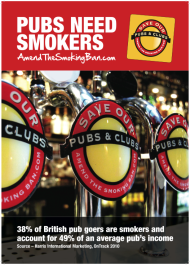Forest response to white paper on public health
 Tuesday, November 30, 2010
Tuesday, November 30, 2010 12:30 ... Still waiting for the details of the Government white paper on public health. According to one BBC report, "Details on how the government aims to tackle individual problems, such as obesity, smoking and drinking, will not be spelt out in full until the new year." However Radio 4's World At One has just reported that tax on high strength beer is to go up, so there may be more detail to come.
Here is Forest's response, based on Health Secretary Andrew Lansley's comments earlier today:
NEWS RELEASE Tuesday 30 November, 2010
WHITE PAPER "A CHARTER FOR SOCIAL ENGINEERING" SAYS SMOKERS' GROUP
A consumer group has warned that the Department of Health white paper on public health could be a "charter for potentially oppressive social engineering".
Simon Clark, director of the smokers' group Forest, said: "Government has no business micro-managing people's lives. For all the talk about nudging, the white paper could be a charter for potentially oppressive social engineering.
"We know what happens when people refuse to be nudged. Campaigners demand more and more regulations and ministers are happy to indulge them.
"The white paper merely transfers that power to local councils.
"We are in danger of creating an immensely dull, zero risk society in which freedom of choice and personal responsibility are consigned to history."
Update: the Guardian has the story, and a quote from our press release, online: White paper hands responsibility for public health to local authorities.
In contrast the Telegraph's medical editor Rebecca Smith appears to have swallowed the Government's line without query: No more nanny state on health: Andrew Lansley
 Simon Clark
Simon Clark
13:45 ... Tobacco to be the subject of a 'Tobacco Control Plan' to be published in the New Year. Can't wait.
 Simon Clark
Simon Clark
14:05 ... Press release and white paper, Healthy Lives, Healthy People, now available on DH website.
In brief, "The White Paper sets out the Government’s long-term vision for the future of public health in England. The aim is to create a ‘wellness’ service (Public Health England) and to strengthen both national and local leadership".
What Government will and won’t do
The Government will take a less intrusive approach, staying out of people’s everyday lives wherever possible. This follows a model called the Nuffield Council of Bioethics Ladder of Interventions, which means that instead of reaching for choice-limiting regulations at every opportunity, the Government will employ a range of evidence based approaches to improve health.
The ladder increases in intrusiveness as follows:
* Do nothing or simply monitor the situation. Some behaviour trends are minor and fizzle out, so intervention isn’t needed.
* Provide information. Giving people the information and education to make a choice for themselves based on evidence.
* Enable choice. Give people a ‘nudge’ in the right direction so they can change their behaviour. For example, through access to public exercise facilities, cycle paths, or safe playgrounds.
* Change the default to help guide choice. Using positive ‘social norms’ is a way of encouraging this.
* Guide choice through incentives. A ‘points mean prizes’ approach, for example the more a child walks to school, they earn points for healthy prizes like an activity day.
* Disincentives, such as taxation or other price related action, to discourage people from smoking or drinking.
* Restrict choice, probably through regulation, such as raising the legal age for smoking or banning trans fats.
* Eliminate choice altogether. Rarely used, but most common examples include making seatbelts compulsory and making dangerous drugs illegal.
Local control, better health
Directors of Public Health will be employed by the Local Authority and be the ambassadors of health issues for the local population. In practice, this means that they will lead discussion about how the ring-fenced money is spent to improve health. This will include influencing investment decisions right across the Local Authority, with the goal of enhancing health and well-being.
Crucially, they will be able to make sure that public health is always considered when local authorities, GP consortia and the NHS make decisions.
To make sure that progress is made on issues like obesity and smoking, Public Health England will set a series of outcomes to measure whether people’s health actually improves.
Less intrusive? I think we'll be the judge of that ...










